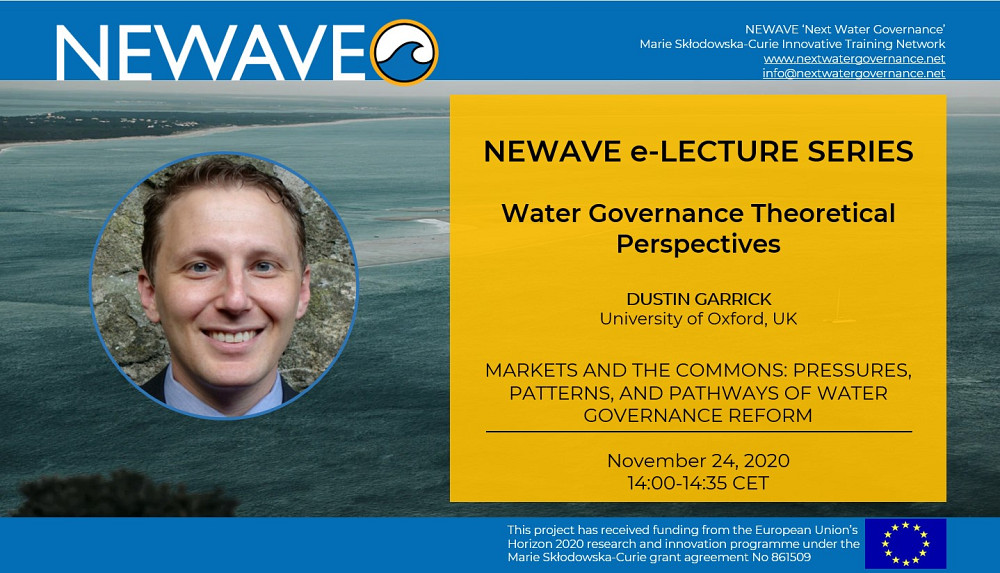NEWAVE e-Lecture Series: Markets and the Commons: Pressures, Patterns, and Pathways of Water Governance Reform | Prof. Dustin Garrick
Markets and the Commons: Pressures, Patterns, and Pathways of Water Governance Reform
Few things are more polarizing than markets as a means of governing the water commons. Water markets are neither new nor novel, however, and there has been growing experience with market-based water governance, spanning from cap-and-trade approaches to informal markets providing water services, particularly across the Global South where small-scale providers are prevalent. This lecture introduces theoretical perspectives from the governance of the commons to examine the political economy of market-based water governance. It explores the pressures, patterns, and pathways of collective action across different types of water markets and considers the implications for the next wave of water governance.
References:
Meinzen-Dick, R. (2007). Beyond panaceas in water institutions. Proceedings of the national Academy of sciences, 104(39), pp.15200-15205.
Ostrom, E. (1993). Design principles in long‐enduring irrigation institutions. Water Resources Research, 29(7), pp.1907-1912.
O'Donnell, E.L. and Garrick, D.E. (2019). The diversity of water markets: Prospects and perils for the SDG agenda. Wiley Interdisciplinary Reviews: Water, 6(5), p.e1368.
Bauer, C.J. (1997). Bringing water markets down to earth: The political economy of water rights in Chile, 1976–1995. World development, 25(5), pp.639-656.
Ostrom, V. (1962). The political economy of water development. The American Economic Review, 52(2), pp.450-458.
Prof. Dustin Garrick
Dr. Dustin E. Garrick is an associate professor of environmental management at the University of Oxford, with a joint appointment at the School of Geography and the Environment and the Smith School of Enterprise and the Environment. He is also a research fellow at Green Templeton College. Dr. Garrick has expertise in environmental governance with a focus on property rights, institutions, and markets. He has twenty years of experience in environmental management with a focus on markets and governance innovations to address resource scarcity and sustainability challenges. In this work, he is interested in the evolution of conflict and cooperation over water and other shared natural resources in the context of climate change, biodiversity loss, and rapid urbanisation. His approach is multi-disciplinary, spanning public policy, geography, and institutional economics, and anchored in field-based and comparative research across a network of observatories which track long-term changes in natural resource conflicts and institutional responses. This work seeks to advance collective action theory and contribute to our understanding of common-pool resource governance. His current research examines the impact of urbanisation on water conflict and cooperation with an emphasis on competition between cities and agriculture for water. He is also examining the evolution and impact of market-based approaches to govern the commons, with a particular interest in the role of informal water markets and their political economy.
About the e-Lecture Series:
This online training module has the objective to engage the NEWAVESRs and the audience in different water governance perspectives. All lectures are open to the public upon registration.
Please register here
A participation certificate can be requested if attending at least 80% of the online public talks.
*All times are in CET (UTC+1)
We would love to know what you think! Please leave a comment below and engage in our online discussion group.




